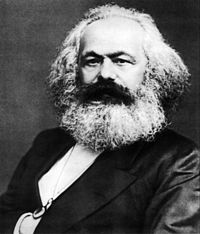What is Marxism? (3)
 •
by
•
by Vasili Zaytsev

Criticism of Capitalism
"We are, in Marx's terms, 'an ensemble of social relations' and we live our lives at the core of the intersection of a number of unequal social relations based on hierarchically interrelated structures which, together, define the historical specificity of the capitalist modes of production and reproduction and underlay their observable manifestations."
—Martha E. Gimenez, Marxism and Class, Gender and Race: Rethinking the Trilogy
According to the Marxist theoretician and revolutionary Vladimir Lenin, "the principal content of Marxism" was "Marx's economic doctrine". Marx believed that the capitalist bourgeois and their economists were promoting what he saw as the lie that "The interests of the capitalist and those of the worker are... one and the same"; he believed that they did this by purporting the concept that "the fastest possible growth of productive capital" was best not only for the wealthy capitalists but also for the workers because it provided them with employment.
Exploitation is a matter of surplus labour — the amount of labour one performs beyond what one receives in goods. Exploitation has been a socio-economic feature of every class society, and is one of the principal features distinguishing the social classes. The power of one social class to control the means of production enables its exploitation of the other classes.
In capitalism, the labour theory of value is the operative concern; the value of a commodity equals the socially necessary labour time required to produce it. Under that condition, surplus value (the difference between the value produced and the value received by a labourer) is synonymous with the term "surplus labour"; thus, capitalist exploitation is realised as deriving surplus value from the worker.
In pre-capitalist economies, exploitation of the worker was achieved via physical coercion. In the capitalist mode of production, that result is more subtly achieved; because the worker does not own the means of production, he or she must voluntarily enter into an exploitive work relationship with a capitalist in order to earn the necessities of life. The worker's entry into such employment is voluntary in that he or she chooses which capitalist to work for. However, the worker must work or starve. Thus, exploitation is inevitable, and the "voluntary" nature of a worker participating in a capitalist society is illusory.
Alienation is the estrangement of people from their humanity (German: Gattungswesen, "species-essence", "species-being"), which is a systematic result of capitalism. Under capitalism, the fruits of production belong to the employers, who expropriate the surplus created by others, and so generate alienated labourers. In Marx's view, alienation is an objective characterization of the worker's situation in capitalism — his or her self-awareness of this condition is not prerequisite.

The identity of a social class derives from its relationship to the means of production; Marx describes the social classes in capitalist societies:
Proletariat: "those individuals who sell their labour power, and who, in the capitalist mode of production, do not own the means of production". The capitalist mode of production establishes the conditions enabling the bourgeoisie to exploit the proletariat because the workers’ labour generates a surplus value greater than the workers’ wages.
Bourgeoisie: those who "own the means of production" and buy labour power from the proletariat, thus exploiting the proletariat; they subdivide as bourgeoisie and the petit bourgeoisie.
Petit bourgeoisie are those who employ labourers, but who also work, i.e. small business owners, peasant landlords, trade workers et al. Marxism predicts that the continual reinvention of the means of production eventually would destroy the petit bourgeoisie, degrading them from the middle class to the proletariat.
Lumpenproletariat: criminals, vagabonds, beggars, et al., who have no stake in the economy, and so sell their labour to the highest bidder.
Landlords: an historically important social class who retain some wealth and power.
Peasantry and farmers: a disorganised class incapable of effecting socio-economic change, most of whom would enter the proletariat, and some become landlords.
Class consciousness denotes the awareness — of itself and the social world — that a social class possesses, and its capacity to rationally act in their best interests; hence, class consciousness is required before they can effect a successful revolution.
Without defining ideology, Marx used the term to denote the production of images of social reality; according to Engels, "ideology is a process accomplished by the so-called thinker consciously, it is true, but with a false consciousness. The real motive forces impelling him remain unknown to him; otherwise it simply would not be an ideological process. Hence he imagines false or seeming motive forces". Because the ruling class controls the society’s means of production, the superstructure of society, the ruling social ideas are determined by the best interests of said ruling class. In The German Ideology, "the ideas of the ruling class are in every epoch the ruling ideas, i.e. the class which is the ruling material force of society, is, at the same time, its ruling intellectual force".
The term political economy originally denoted the study of the conditions under which economic production was organised in the capitalist system. In Marxism, political economy studies the means of production, specifically of capital, and how that manifests as economic activity.
to be continued...


Comments
if there's no pirinç, eat pasta instead...
pirinç o7 done.....
shine bright like a diamond shine bright like a diamond shine bright like a diamond shine bright like a diamond
shine bright like an inci
hail hitler
heil Karl Marx
voted o7
i'll eat pasta, that's what i prefer.
heil Karl Marx
dont say hail or heil say . Long live 😉
Long live Karl Marx
voted